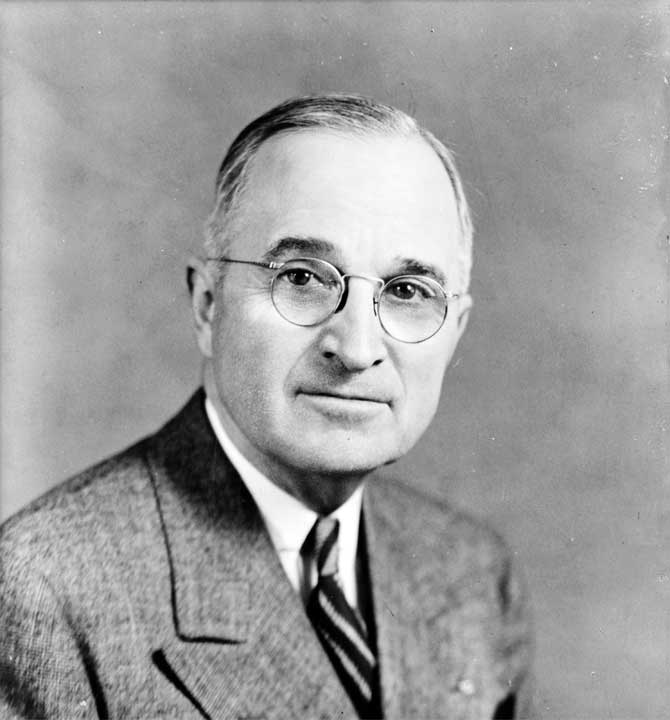Harry Truman
1884-1972
American Politician

US statesman Harry S. Truman was born in Lamar, Missouri. Truman served in the Missouri National Guard from 1905 to 1911, and volunteered for active duty during World War I. He served in France in the field artillery, rising from Lieutenant to Major.
In 1934, Truman was elected to the US Senate. He entered, encumbered by his reputation as a machine politician controlled by political bosses.
Truman was a strong supporter of the policies of Franklin Roosevelt. He came to national prominence in his role as head of the committee investigating the National Defense Program. He identified over $5 billion in unnecessary spending.
In 1944, Roosevelt gave into pressure from party leaders and agreed to replace Henry Wallace as his Vice Presidential candidate. He selected Truman.
In April 1945, with the death of Franklin Roosevelt, Truman became President. The day after assuming the Presidency, Truman stated to a reporter: "I felt like the moon, the stars and all the planets had fallen on me." Truman became President less than a month before the end of the war in Europe. He attended the final war summit at Potsdam.
There, Truman had his first personal encounter with Stalin. At Potsdam, the Allies issued an ultimatum demanding immediate Japanese surrender.
Truman reluctantly decided to use the atomic bomb. He was concerned about its possible effects, but feared the cost of invading Japan.
Truman is best known for his foreign policy. Soviet action in Eastern Europe in the year following the end of the war made it clear that the U.S.S.R.'s goal was the domination of Eastern Europe.
In 1947, Churchill gave what became known as the "Iron Curtain" speech, in which he stated that an iron curtain had descended across Europe. Truman responded by announcing the Truman Doctrine, in which he stated: "I believe that it must be the policy of the United States to support free peoples who are resisting attempted subjugation by armed minorities or by outside pressures."
When the Soviets began to pressure Turkey and Greece into an alliance, Truman won Congressional approval for large-scale aid to those countries. He supported Secretary of State Marshall's Plan, through which the United States spent $13 billion to help rebuild Europe.
When the Soviets blockaded Berlin, Truman responded vigorously by ordering the airlift that eventually carried 2 million tons of emergency supplies to West Berlin.
In 1949, the United States helped establish the North Atlantic Treaty Organization (NATO). NATO was organized to provide a common defense mechanism to defend Europe against Soviet attack.
In 1950, the North Koreans attacked South Korea. Truman responded immediately. He and other major policy leaders feared that this was the first round of another world war. The United States came to the immediate defense of South Korea, and organized a joint United Nations action. After an initial rout, US forces took the offensive.
They had almost completely conquered North Korea, when the Communist Chinese intervened on the side of the North Koreans. The war eventually ended in stalemate.
Truman's record on domestic issues was not as impressive as his foreign affairs activities. He announced a program called "The Fair Deal" immediately after World War II. Through this policy, he succeeded in having Congress pass the Federal Housing Act of 1949 that provided money for slum clearance. In addition, the minimum wage was raised and social security coverage was expanded. He was unable, however, to achieve passage of a law for a National Health Insurance program, nor could he repeal the Taft-Hartley Act.
Truman did succeed in desegregating the US armed forces. Years after his death, Truman remains one of America's most admired Presidents.
 >
>